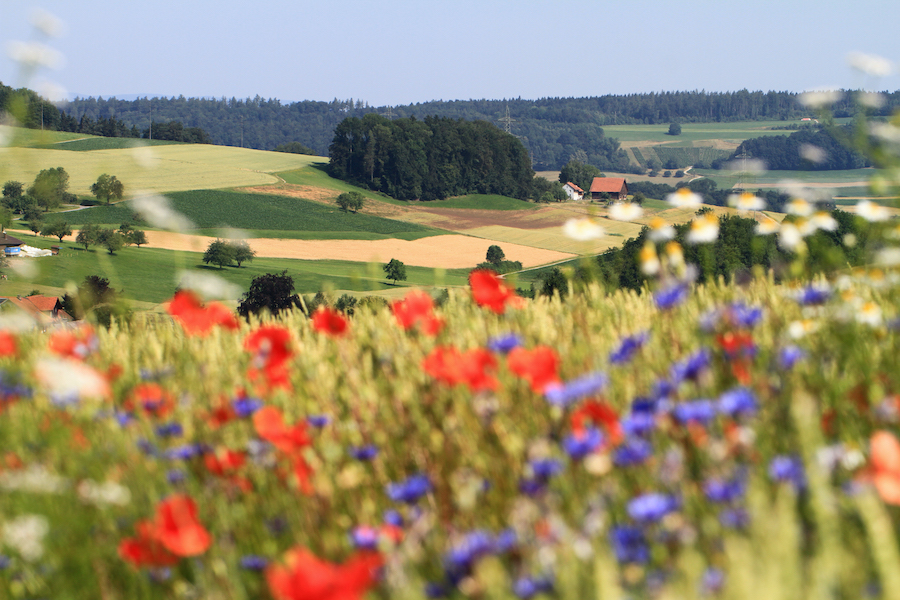 Earth & Space
Earth & Space
Why does biodiversity matter for agriculture?
Our study demonstrates the benefits of biodiversification for agriculture. In essence, agricultural fields with greater biodiversity are better protected from harmful insect pests, promote wild pollination, and produce higher yields.

Nature is a vital service provider for agriculture in many ways. Fruit trees and other pollinator-dependent crops are pollinated by wild insects like bumblebees, solitary bees, or flies. Other insects like predatory ladybugs or ground beetles eat pests that would otherwise damage or even destroy crops. All these organisms play a key role in agroecosystems providing multiple ecosystem functions critical to food production.
The ongoing conversion of natural or seminatural land for agriculture and the fusing to larger crop fields - a process called landscape simplification - are threating agricultural biodiversity by killing off insects' food and resources. With declines of insects, the ecosystems services the insects provided might wane as well. Yet, it remains unclear how these changes affect the number and mix of these species and ultimately how agricultural production might change as a result.
To solve these questions, we compared data from roughly 1,500 agricultural fields around the world, covering a variety of landscapes: from American corn crops to oilseed rape fields in southern Sweden, from coffee plantations in India to the mango groves of South Africa and cereal crops in the Alps. We analyzed the diversity of pollinating and pest-controlling insects at these sites along with an assessment of pollination and biological pest control services. In short, we looked at the processes regulated by nature that are beneficial and free for humans, also called ecosystem services.
We found that heterogeneous landscapes (those where the variation of crops, hedges, trees and meadows is greater) support more abundant and diversified populations of wild pollinators and beneficial insects. Overall, species richness of service-providing organisms can increase in these landscapes by approximately 40%. This directly leads, not only to more pollination and greater biological control of pests (the provision of ecosystem services was more than doubled), but also to greater crop yields.
On the other hand, landscape simplification - through intensification of agriculture, creation of monocultures, and loss of natural vegetation - lead to harmful effects for crops: there are fewer service-providing insects, less pollination services and lower biological control of pests, making crops less productive despite external inputs of fertilizers and pesticides. Up to half of these detrimental effects of landscape simplification come as a result of a loss of service-providing insects.
We also looked at a further measure - called evenness (or the complementary term, dominance) - that may have relevance to the makeup of insect populations. In real-world ecosystems, a handful of highly abundant, dominant species live alongside a higher number of rarer species. As landscapes became less diverse, insect assemblages become impoverished and dominated by a few abundant species. These species, however, supply ecosystem services less efficiently than in more diverse landscapes where relatively rare species provide a valuable contribution in addition to dominant ones.
In summary, our paper shows that biodiversity is essential to ensure the provision of ecosystem services and maintain high and stable crop yields. For example, a farmer can depend less on pesticides to get rid of harmful insects if natural biological control is increased through higher agricultural biodiversity. With ongoing global change, the value of farmland biodiversity ensuring greater resilience against environmental disturbances will become even more important.
These findings provide therefore strong arguments to promote the adoption of science-based agricultural practices and policies that simultaneously improve both the protection of biodiversity and the production of food. Diversifying agricultural landscapes can be one of the keys. Diversification could be as simple as adding wildflower strips, trees or hedgerows along the edges of fields, giving these beneficial species places to live. But creating a web of these seminatural habitats would be an essential step towards a more sustainable agriculture that aims to reconcile both productivity and conservation within agricultural landscapes. However, many socioeconomic conflicts impede to uptake a larger-scale integration of these agroecological practices. The major challenge will therefore be to help implement a landscape management system that benefits everyone - nature and mankind. This will require a collective participation among farmers, citizens, nonprofits and government agencies.
Original Article:
Dainese M, Martin E, Aizen M et al. A global synthesis reveals biodiversity-mediated benefits for crop production. Sci Adv. 2019;5(10):eaax0121.Edited by:
Massimo Caine , Founder and Director
We thought you might like
GMOs are not a human invention: sweet potato is a naturally transgenic food crop
Jul 6, 2015 in Plant Biology | 3 min read by Tina KyndtCloudy days cost yield until scientists hacked photosynthesis
Feb 2, 2017 in Plant Biology | 3.5 min read by Stephen Long , Katarzyna Głowacka , Johannes KromdijkBringing the flavor back to modern tomatoes
Dec 1, 2017 in Plant Biology | 3 min read by Denise TiemanThe Poisoned Oasis: Neonicotinoid Spillover Harms Bees Near Corn
Jul 5, 2018 in Earth & Space | 4 min read by Nadia Tsvetkov , Amro ZayedMore from Earth & Space
Discovery of the first radiation belt beyond the Solar System
Jan 27, 2025 in Earth & Space | 3.5 min read by Juan Bautista Climent OliverOne million (paper) satellites
Jan 24, 2025 in Earth & Space | 3 min read by Ewan Wright , Andrew FalleVolcanic Ash: A Nutrient Boost for Reef-Building Corals
Sep 18, 2024 in Earth & Space | 4 min read by Frank Förster , Tom SheldrakeAmmonia Energy: A Call for Environmental Awareness
Aug 29, 2024 in Earth & Space | 3.5 min read by Matteo Bertagni , Robert Socolow , Amilcare PorporatoLikely increase in coral thermal tolerance at a Pacific archipelago
Dec 29, 2023 in Earth & Space | 3 min read by Liam LachsEditor's picks
Trending now
Popular topics


